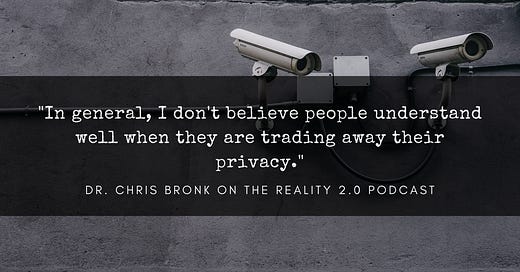How Did Disinformation Become the Truth?
And why is it so believable? We talk disinformation from a cybersecurity perspective, and IoT device vulnerability.
A Quick Plug
Episode 62: How Did Disinformation Become the Truth?
Katherine Druckman and Doc Searls talk to Prof. Chris Bronk, Ph.D. and Petros Koutoupis about disinformation and cyber security, and how they impact our lives, as well as IoT vulnerabilities and voice recognition technology.
Please remember to subscribe via the podcast player of your choice.
Enjoying the Reality 2.0 newsletter? Please share it with a friend or colleague.
Last week, we spoke to Dr. Chris Bronk, Associate Professor at the University of Houston, about online disinformation from his perspective as a technologist and cybersecurity scholar. We sought to unpack both how disinformation campaigns function, and how dangerous they can be. Dr. Bronk has a particular interest in the topic, and we were happy to get a chance to have a fun chat about these and other fairly meaty issues.
In “America must improve defense against Russia's information warfare”, a 2017 editorial in The Hill, he wrote:
The bad news in all of this is that the U.S. and other Western democracies appear woefully unprepared to blunt or deter Russian propaganda. The Russians have all sorts of domestic information controls, but we largely don’t. That does not mean other elements of civil society – academics, activists, and technologists – can’t begin to identify and flag propaganda floated through gray sources, however.
Not that long ago, we collectively thought of disinformation threats as typically the work of foreign actors, but fast forward a bit, and we’re forced to look at domestic sources as meme campaigns, or “the billboards of the internet,” as Chris calls them, seem to have taken over as a significant source of truth for many. In an astute observation, Dr. Bronk is quoted in the Houston Chronicle as follows:
Bronk said it’s become increasingly clear that reforms are needed to counter domestic hate groups and hostile foreign governments that use social media to ply the American public with disinformation.
But when the same politicians who regulate the industry are also being flagged for making false or misleading statements, Bronk sees little room for agreement.
“I got a tweet this morning at seven whatever, the president put out there and it just said, ‘I won the election.’ Is that true?” said Bronk, a former foreign service officer with the State Department. “The internet has allowed us to divorce ourselves from some sets of facts.”
These and other ideas are the springboard from which we launched our conversation in this recent episode. We had great fun talking with Dr. Bronk, and we hope to welcome him back, so please send any questions you have for him our way and we’ll explore them in a future episode.
Please send us our thoughts here in a comment, or on any of our social outlets, or via our contact form.
Site/Blog/Newsletter | Facebook | Twitter | YouTube | Mastodon
This Week’s Reading List
“Misinformation” vs. “Disinformation”: Get Informed On The Difference - Dictionary.com — Disinformation means “false information, as about a country’s military strength or plans, disseminated by a government or intelligence agency in a hostile act of tactical political subversion.” It is also used more generally to mean “deliberately misleading or biased information; manipulated narrative or facts; propaganda.” So, disinformation is knowingly spreading misinformation. Our first definition of this word gives one major reason why a person or group might want to spread wrong information, but there are many other nefarious motivations lurking behind the creation of disinformation.
Amazon.com: The Age of Surveillance Capitalism: The Fight for a Human Future at the New Frontier of Power (9781541758001): Zuboff, Shoshana: Books — In this masterwork of original thinking and research, Shoshana Zuboff provides startling insights into the phenomenon that she has named surveillance capitalism. The stakes could not be higher: a global architecture of behavior modification threatens human nature in the twenty-first century just as industrial capitalism disfigured the natural world in the twentieth.
Amazon.com: Active Measures (9781250787408): Rid, Thomas: Books
Internet-based chastity belts hijacked by malicious hackers | Boing Boing — Oh man. A bluetooth-controlled chastity belt was the recent victim of a hacker attack. The Cellmate Chastity Cage, made by Chinese company Qiui, was designed so that users are able to lock and unlock their sex partner's penis prison remotely. Users caught in the attack were threatened with having their genitals locked in permanently unless they paid a 0.02 bitcoin (about $270) ransom.
Thank You!
We look forward to sharing our weekly recaps, reading lists and inspiration with you as we navigate our collective digital reality. We hope you enjoy taking this virtual journey with us, and we’ll do our best to be pleasant travel companions. Cheers until next time!
Thank you especially to our Patreon supporters who help us keep the podcast and newsletter going!
Note: Please add us to your address book so we don’t end up in your spam folder.
If you enjoyed this edition, please click the heart below to let us know!




